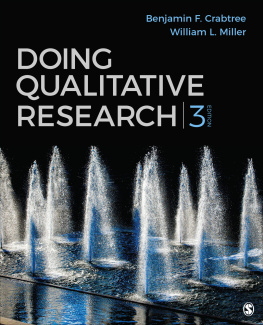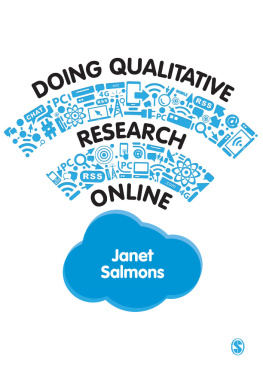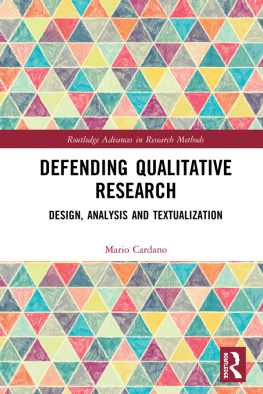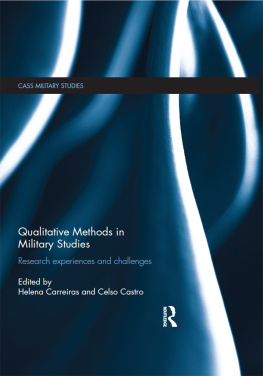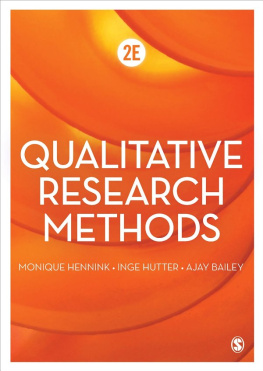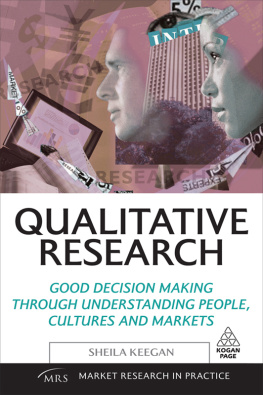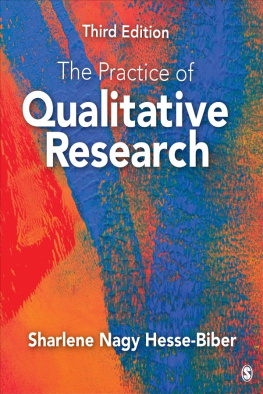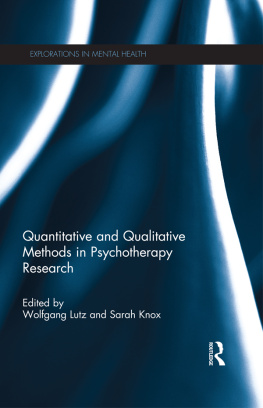Qualitative Longitudinal Research
Bloomsbury Research Methods
Edited by Graham Crow and Mark Elliot
The Bloomsbury Research Methods series provides authoritative introductions to a range of research methods which are at the forefront of developments in a range of disciplines.
Each volume sets out the key elements of the particular method and features examples of its application, drawing on a consistent structure across the whole series. Written in an accessible style by leading experts in the field, this series is an innovative pedagogical and research resource.
Also available in the series
Community Studies , Graham Crow
Diary Method , Ruth Bartlett and Christine Milligan
GIS , Nick Bearman
Inclusive Research , Melanie Nind
Quantitative Longitudinal Data Analysis , Vernon Gayle and Paul Lambert
Rhythmanalysis , Dawn Lyon
Forthcoming in the series
Embodied Inquiry , Jennifer Leigh and Nicole Brown
Statistical Modelling in R , Kevin Ralston, Vernon Gayle, Roxanne Connelly and Chris Playford
For my mother, Gwendoline
(19162017)
who lived through a century of change
and for my grandson, Luka
(b. 2017)
who will see the future unfold.
Qualitative Longitudinal Research
Research Methods
Bren Neale
Contents
This book is built on the accumulated wisdom of generations of researchers who have pioneered qualitative longitudinal research. It has been a privilege and pleasure to meet and work alongside a good number of these researchers in recent years. This was made possible through a series of research grants from the Economic and Social Research Council, including a mid-career fellowship, national and international seminar series, and funding for a five-year programme of qualitative longitudinal (QL) research and archiving (the Timescapes Study) . I owe a particular debt of gratitude to my Timescapes colleagues, and to the affiliated researchers, archivists, secondary analysts and time theorists who enriched the programme. This was an exhilarating, cutting-edge environment to develop the ideas for this book. Many thanks also to Graham Crow, series editor, for the invitation to write this text, and for his support and encouragement, and Maria Giovanna Brauzzi and the team at Bloomsbury Academic for gently steering the project. Finally, special thanks (and apologies) to my family, especially to Alan, who read every word and was there every step of the way.
The idea behind this book series is a simple one: to provide concise and accessible introductions to frequently used research methods and of current issues in research methodology. Books in the series have been written by experts in their fields with a brief to write about their subject for a broad audience.
The series has been developed through a partnership between Bloomsbury and the UKs National Centre for Research Methods (NCRM). The original What is? Research Methods Series sprang from the eponymous strand at NCRMs Research Methods Festivals.
This relaunched series reflects changes in the research landscape, embracing research methods innovation and interdisciplinarity. Methodological innovation is the order of the day, while still maintaining an emphasis on accessibility to a wide audience. The format allows researchers who are new to a field to gain an insight into its key features, while also providing a useful update on recent developments for people who have had some prior acquaintance with it. All readers should find it helpful to be taken through the discussion of key terms, the history of how the method or methodological issue has developed, and the assessment of the strengths and possible weaknesses of the approach through analysis of illustrative examples.
This book is devoted to QL research. In it, Bren Neale describes the growing interest that exists in the potential of a range of qualitative tools and techniques to capture how peoples lives unfold over time. Appreciating the detail of individual journeys through the life course assists in understanding how trajectories are patterned as well as being remarkably diverse. Practitioners of QL research quickly become familiar with the conceptual, practical and ethical challenges of studying the unfolding character of peoples routes through life. The meaning of time can be difficult to pin down, while the systematic study of processes over prolonged periods requires not only good organization and determination but also the ability to handle the presence of difficulties that inevitably feature in peoples lives. To follow a life will be likely to involve encounters with sickness as well as health, privation as well as prosperity, and sorrow as well as happiness. But the rewards of following lives over time using qualitative methods are extensive, including the illumination of large-scale social change at a level that is more readily grasped than it is through the more abstract structural accounts that are associated with the analysis of quantitative data sets. It is for this reason that researchers are increasingly to be found exploring the complementarity of qualitative and quantitative longitudinal analysis, and Neales contribution to this What is? series dovetails with that by Vernon Gayle and Paul Lambert. The two approaches may have different origins, but they do have several points of connection, not least the appreciation of how an event can take on the form of a turning point in a life story, and how such events are linked to broader patterns of social change.
The books in this series cannot provide information about their subject matter down to a fine level of detail, but they will equip readers with a powerful sense of reasons why it deserves to be taken seriously and, it is hoped, with the enthusiasm to put that knowledge into practice.
Introduction
At a time when social forces are making instability a way of life, researchers are developing new modes of enquiry that take account of the dynamic nature of peoples lives. Approaches to thinking dynamically have triggered the beginning of an intellectual revolution, one that blends insights from across the social sciences, merges quantitative and qualitative methodologies, combines macro and micro views of society and exploits the power of international comparison. (Leisering and Walker 1998, xiv)
Qualitative Longitudinal research (QL research, QLR or QPR) is a rich and evolving methodology for exploring the dynamic nature of peoples lives. It has developed in piecemeal fashion across different research traditions, a process reflected in the varied labels used to describe it (from Longitudinal Ethnography to Qualitative Panel Studies). As the quotation above suggests, QL research is part of a broad temporal turn in social enquiry that has emerged gradually over the past decades. With its dual identity (both longitudinal and qualitative), QL research spans two established methodological traditions. As a small but vital component of the longitudinal canon, it seeks to follow the same individuals or small collectives (households or varied forms of organization) prospectively, in real time, as lives unfold. As part of the rich field of qualitative temporal studies, QL research explores dynamic processes through an in-depth, qualitative lens. This gives insights into how people narrate, understand and shape their unfolding lives and the evolving world of which they are a part. QL research is conducted through time; but it also engages with the temporal dimensions of experience, opening up the potential to think dynamically in creative, flexible and innovative ways. These features of QL research suggest it is part of a developing theoretical orientation, an emerging paradigm for social research that offers new and exciting ways to know and understand the social world.


